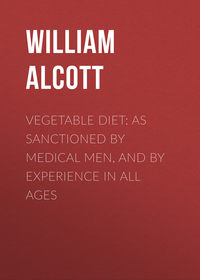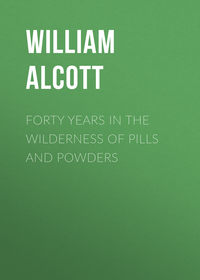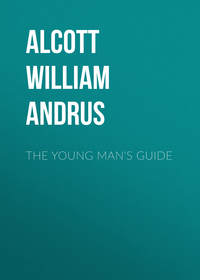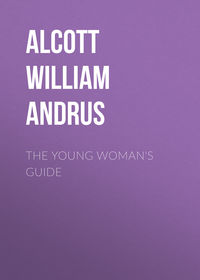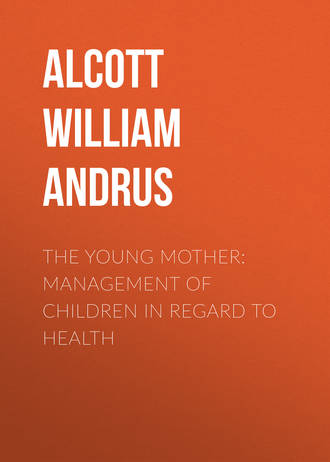
The Young Mother: Management of Children in Regard to Health
The arrangements of the infant school, also, seem designed for the same purpose—to repress as much as possible the infantile desire for amusement. Not that this was their original, nor that it now is their legitimate intention. Their legitimate object is, or should be, not to develope the intellect by over-working the tender brain, but to promote cheerfulness and health and love and happiness, by well contrived amusements, conducted as much as possible in the open air; and by unremitting efforts to elicit and direct the affections.
Infant schools should repress rather than encourage the hard study of books. Lessons at this age should be drawn chiefly from objects in the garden, the field, and the grove; from the flower, the plant, the tree, the brook, the bird, the beast, the worm, the fly, the human body—the sun, or the visible heavens. These lessons, whether given by the parent, as constituting a part of the family arrangements, or by the infant or primary school teacher, should, it is true, be regarded for the time being as study, but they should never be long; and they should be frequently relieved by the most free and unrestrained pastimes and gambols of the young on the green grass, or beside the rippling stream, uninfluenced, or at least unrepressed, by those who are set over them.
The public or common school, overlooking as it does any direct attempts to make provision for the amusement of the pupils, even during the scanty recess that is afforded them once in three hours, would appear to a stranger on this planet, at first sight, to be designed as much as possible to defeat every intention of nature with reference to the growth of the human frame. For we may often travel many hundred miles and not see so much as an enclosed play ground; and never perhaps any direct provision for particular and more favorable amusements.
I might speak of other schools and places of resort for children, and proceed to show how all our arrangements appear to be the offspring of a species of utilitarianism which rejects every sport whose value cannot be estimated in dollars and cents. I might even refer to those schools of our country where these ultra utilitarian notions are carried to an extent which excludes amusing conversation or reading even during meal-time; and devotes the hours which were formerly spent in recreation, to manual labor of some productive kind or other.—But I forbear. Enough has been said to illustrate the position I have taken, that there is in vogue a system which bears the marks of having been contrived, if not by the enemies of our race, either openly or covertly, at least by those whom ignorance renders scarcely less at war with the general happiness.
Now I would not deny nor attempt to deny that change of occupation of body or mind is of itself an amusement, and one too of great value. Undoubtedly it is so. To some children, studies of every kind are an amusement; and there are few indeed to whom none are so. Labor, with many, when alternated with study, is amusing. And yet, after all, unless such labors are performed in company, where light and cheerful conversation is sure to keep the mind away from the subjects about which it has just been engaged, I am afraid that the purposes for which amusements were designed, are very far from being all secured.
But perhaps I am dwelling too long on the general principle that people of every age, and children in particular, need, and must have amusements, whether they are of a productive kind or not; and that it is very far from being sufficient, were it either practicable or desirable, to turn all study and labor into amusement.18 My business is with those who direct the first dawnings of affection and intellect. Principles are by no means of less importance on this account; but the limits of a work for young mothers do not admit of anything more than a brief discussion of their importance.
I will now proceed to speak of some of the more common amusements of the nursery.
I have seen very young children sit on the floor and amuse themselves for nearly half an hour together, with piling up and taking down small wooden cubes, of different sizes. Some of them, instead of being cubes, however, may be of the shape of bricks. Their ingenuity, while they are scarcely a year or two old, in erecting houses, temples, churches, &c., is sometimes surprising. Girls as well as boys seem to be greatly amused with this form of exercise; and both seem to be little less gratified in destroying than in rearing their lilliputian edifices.
Next to the latter kind of amusement, is the viewing of pictures. It is surprising at what an early age children may be taught to notice miniature representations of objects; living objects especially. Representations of the works of art should come in a little later than those of things in nature. I know a father who prepares volumes of pictures, solely for this purpose; though he usually regards them not only as a source of amusement to children, but as a medium of instruction.
Battledoor or shuttlecock may be taught to children of both sexes very early; and it affords a healthy and almost untiring source of amusement. It gives activity as well as strength to the muscles or moving powers, and has many other important advantages. There is some danger, according to Dr. Pierson19 of distorting the spine by playing at shuttlecock too frequently and too long; but this will seldom be the case with little children in the nursery. Neither shuttlecock nor any other amusement will secure their attention long enough to injure them very much.
Perhaps this exercise comes nearer to my ideas of a perfect amusement than almost any which could be named. The mind is agreeably occupied, without being fatigued; and if the amusements are proportioned to the age and strength of the child, there is very little fatigue of the body. It gives, moreover, great practical accuracy to the eye and to the hand.
A rocking-horse is much recommended for the nursery. I have had no opportunity for observing the effects of this kind of amusement; but if it is one half as valuable as some suppose, I should be inclined to recommend it. But I am opposed to fostering in the rider lessons of cruelty, by arming him with whips and spurs. If the young are ever to learn to ride, on a living horse, the exercises of the rocking-horse will, most certainly, be a sort of preparation for the purpose.
Tops and marbles afford a great deal of rational amusement to the young; and of a very useful kind, too. Spinning a top is second to no exercise which I have yet mentioned, unless it is playing at shuttlecock.
Dr. Dewees recommends a small backgammon table, with men, but without dice. He says, also, that "children, as soon as they are capable of comprehending the subject, should be taught draughts or checkers. This game is not only highly amusing, but also very instructive." In another place he heaps additional encomiums upon the game of checkers. "It becomes a source of endless amusement," he says, "as it never tires, but always instructs." Of exercises which instruct, however, as well as amuse, I shall speak presently.
The amusements called "morrice," "fox and geese," &c., with which some of the children of almost every neighborhood are more or less acquainted, are of the same general character and tendency as checkers. So is a play, sometimes, but very improperly, called dice, in which two parties play with a small bundle of wooden pins, not unlike knitting pins in shape, but shorter.
The writer to whom I have referred above recommends nine-pins and balls of proper size, as highly useful both for diversion and exercise. If they can be used without leading to bad habits and bad associations, I think they may be useful.
For girls, who demand a great deal more of exercise, both within doors and without, skipping the rope is an excellent amusement. So also is swinging. Both of these exercises may be used either out of doors, or in the nursery.
Trundling a hoop I have always regarded as an amusing out-of-door exercise; and I am not sorry when I sometimes see girls, as well as boys, engaged in it, under the eye of their mothers and teachers.
Playing ball, of which there are many different games, and flying kites, employ a large proportion if not all of the muscles of the body, in such a manner as is likely to confirm the strength, and greatly improve the health. The same may be said of skating in the winter, and swimming in the summer. But these last are exercises over which the mother cannot, ordinarily, have very much control.
Under the head of amusements, it only remains for me to speak of a few juvenile employments of a mixed nature. Of these I shall treat very briefly, as they are a branch of the subject which does not necessarily come within the compass of my present plan. They are exercises, too, which should more properly come under the head of Infantile Instruction.
Dissected maps afford children of every age a great fund of amusement; but much caution is necessary, with those that are very young, not to discourage or confound them by showing them too many at once. Thus if we cut in pieces the map of one of the smaller United States, at the county lines, or the whole United States, at the state lines, it is quite as many divisions as they can manage. Cut up as large a state, even, as Pennsylvania or New York is, into counties, and try to lead them to amuse themselves by putting together so large a number, many of which must inevitably very closely resemble each other, and it is ten to one but you bewilder, and even perplex and discourage them. The same results would follow from cutting up even the whole of a large county, or a small state, into towns. I have usually begun with little children, by requiring them to put together the eight counties of the small state of Connecticut. In this case the counties are not only few, but there is a very striking difference in their shape.
A black board and a piece of chalk, along with a little ingenuity on the part of the mother, will furnish the child with an almost endless variety of amusement. Let him attempt to imitate almost any object which interests him, whether among the works of nature or art. However rude his pictures may be, do not laugh at, but on the contrary, endeavor to encourage him. He may also be permitted to imitate letters and figures. The elements of letters, too, both printed and written, may be given him, and he may be required to put them together. Dissected pictures, as well as dissected maps and letters, are useful, and to most children, very acceptable.
In short, the devices of an ingenious, thinking mother, for the amusement of her very young children, are almost endless; and the great danger is, that when a mother once enters deeply into the spirit of these exercises, she will substitute them for those much more healthy ones which have been already mentioned, such as require muscular activity, or may be performed in the open air.
CHAPTER XII.
CRYING
Its importance. Danger of repressing a tendency to cry. Anecdote from Dr. Rush. Physiology of crying. Folly of attempting wholly to suppress it.
"Crying," says Dr. Dewees, "should be looked upon as an exercise of much importance;" and he is sustained in this view by many eminent medical writers.
But people generally think otherwise. Nothing is more common than the idea that to cry is unbecoming; and children are everywhere taught, when they suffer pain, to brave it out, and not cry. Such a direction—to say nothing of its tendency to encourage hypocrisy—is wholly unphilosophical. The following anecdote may serve in part to illustrate my meaning. It is said to have been related by Dr. Rush.
A gentleman in South Carolina was about to undergo a very painful surgical operation. He had imbibed the idea that it was beneath the dignity of a man ever to say or do anything expressive of pain. He therefore refused to submit to the usual precaution of securing the hands and feet by bandages, declaring to his surgeon that he had nothing to fear from his being untied, for he would not move a muscle of his body. He kept his word, it is true; but he died instantly after the operation, from apoplexy.
There is very little doubt, in the mind of any physiologist, in regard to the cause of apoplexy in this case; and that it might have been prevented by the relief which is always afforded by groans and tears.
It is, I believe, very generally known, that in the profoundest grief, people do not, and cannot shed tears; and that when the latter begin to flow, it affords immediate relief.
I do not undertake to argue from this, that crying is so important, either to the young or the old, that it is ever worth while to excite or continue it by artificial means; or that a habit of crying, so easily and readily acquired by the young, is not to be guarded against as a serious, evil. My object was first to show the folly of those who denounce all crying, and secondly, to point out some of its advantages—in the hope of preventing parents from going to that extreme which borders upon stoicism.
One of the most intelligent men I ever knew, frequently made it his boast that he neither laughed nor cried on any occasion; and on being told that both laughing and crying were physiologically useful, he only ridiculed the sentiment.
Crying is useful to very young infants, because it favors the passage of blood in their lungs, where it had not before been accustomed to travel, and where its motion is now indispensable. And it not only promotes the circulation of the blood, but expands the air-cells of the lungs, and thus helps forward that great change, by which the dark-colored impure blood of the veins is changed at once into pure blood, and thus rendered fit to nourish the system, and sustain life.
But this is not all. Crying strengthens the lungs themselves. It does this by expanding the little air-cells of which I have just spoken, and not only accustoms them to being stretched, at a period, of all others, the most favorable for this purpose, but frees them at the same time from mucus, and other injurious accumulations.
They, therefore, who oppose an infant's crying, know not what they do. So far is it from being hurtful to the child, that its occasional recurrence is, as we have already seen, positively useful. Some practitioners of medicine, in some of the more trying situations in which human nature can be placed, even encourage their patients to suffer tears to flow, as a means of relief.
Infants, it should also be recollected, have no other language by which to express their wants and feelings, than sighs and tears. Crying is not always an expression of positive pain; it sometimes indicates hunger and thirst, and sometimes the want of a change of posture. This last consideration deserves great attention, and all the inconveniences of crying ought to be borne cheerfully, for the sake of having the little sufferer remind us when nature demands a change of position. No child ought to be permitted to remain in one position longer than two hours, even while sleeping; nor half that time, while awake; and if nurses and mothers will overlook this matter, as they often do, it is a favorable circumstance that the child should remind them of it.
Crying has been called the "waste gate" of the human system; the door of escape to that excess of excitability which sometimes prevails, especially among children and nervous adults. To all such persons it is healthy—most undoubtedly so; nor do I know that its occasional recurrence is injurious to any adult—a fastidious public sentiment to the contrary notwithstanding.
Some have supposed, that what is here said will be construed by the young mother into a license to suffer her child to cry unnecessarily. Perhaps, say they, she is a laboring woman, and wishes to be at work. Well, she lays down her child in the cradle, or on the bed, and goes to her work. Presently the child, becoming wet perhaps, begins to cry, as well he might. But, instead of going to him and taking care of him, she continues at her employment; and when one remonstrates against her conduct as cruelty, she pleads the authority of the author of the "Young Mother."
All this may happen; but if it should, I am not answerable for it. I have insisted strongly on guarding the child against wet clothing, and on watching him with the utmost care to prevent all real suffering. Mothers, like the specimen here given, if they happen to have a little sensibility to suffering, and not much love of their offspring, generally know of a shorter way to quiet their infants and procure time to work, than that which is here mentioned. They have nothing to do but to give them some cordial or elixir, whose basis is opium. Startle not, reader, at the statement;—this abominable practice is followed by many a female who claims the sacred name of mother. And many a wretch has thus, in her ignorance, indolence or avarice, slowly destroyed her children!
I repeat, therefore, that I do not think my remarks on crying are necessarily liable to abuse; though I am not sure that there are not a few individuals to be found who may apply them in the manner above mentioned—an application, however, which is as far removed from the original intention of the author, as can possibly be conceived.
CHAPTER XIII.
LAUGHING
"Laugh and be fat." Laughing is healthy. A common error. Monastic notions yet too prevalent on this subject.
Laughing, like crying, has a good effect on the infantile lungs; nor is it less salutary in other respects. "Laugh and be fat," an old adage, has its meaning, and also its philosophy.
There is an excess, however, to which laughing, no less than crying, may be carried, and which we cannot too carefully avoid. But how little to be envied—how much to be pitied—are they who consider it a weakness and a sin to laugh, and in the plenitude of their wisdom, tell us that the Saviour of mankind never laughed. When I hear this last assertion, I am always ready to ask, whether the individual who makes it has read a new revelation or a new gospel; for certainly none of the sacred books which I have seen give us any such information.
But I will not dwell here. The common notion on this subject, if not ridiculous, is certainly strange. I will only add, that, come into vogue as it might have done, there is no opinion more unfounded than the very general one among adults, that children should be uniformly grave; and that just in proportion as they laugh and appear frolicsome, just in the same proportion are they out of the way, and deserving of reprehension.
It is strange that it should be so, but I have seen many parents who were miserable because their children were sportive and joyful. Oh, when will the days of monkish sadness and austerity be over; and the public sentiment in the christian world get right on this subject!
CHAPTER XIV.
SLEEP
General remarks. Hints to fathers.—SEC. 1. Proper hours for repose. Dark rooms. Noise.—SEC. 2. Place for sleeping. Sleeping alone—reasons.—SEC. 3. Purity of the air in sleeping rooms.—SEC. 4. The bed. Objections to feathers. Other materials.—SEC. 5. The covering of beds. Covering the head.—SEC. 6. Night Dresses. Robes.—SEC. 7. Posture of the body in sleep.—SEC. 8. State of the mind.—SEC. 9. Quality of sleep.—SEC. 10. Quantity of sleep.
Not a few persons consider all rules relative to sleep as utterly futile. They regard it as so much of a natural or animal process, that if we are let alone we shall seldom err, at any age, respecting it. Rules on the subject, above all, they regard as wholly misplaced.
Those who entertain such views, would do well, in order to be consistent, to go a little farther; and as breathing and eating and drinking—nay, even thinking—are natural processes, deny the utility of all rules respecting them also. Perhaps they would do well, moreover, to deny that rules of any sort are valuable. But would not this have the effect to bar the door perpetually against all human improvement? Would it not be equivalent to saying, to a half-civilized, because only half-christianized community—Go on with your barbarous customs, and your uncleanly and unthinking habits, forever?
But I have not so learned human nature. I regard man as susceptible of endless progression. And I know of no way in which more rapid progress can be made, than by enlightening young mothers on subjects which pertain to our physical nature, and the means of physical improvement. Not for the sake of that perishable part of man, the frame, but because it is nearly in vain to attempt to improve the mind and heart, without due attention to the frame-work, to which mind and heart, for the present, are appended, and most intimately related.
Let it be left to fathers to study the improvement of hounds and horses and cattle, and at the same time to think themselves above the concerns of the nursery. We may, indeed, read of a Cato once in three thousand years, who was in the habit of quitting all other business in order to be present when the nurse washed and rubbed his child. But our passion for gain, in the present age, is so much more absorbing and soul-destroying than the passion for military glory, that we cannot expect many Catos. Oh no. All, or nearly all, must devolve on the mother. The father has no time to attend to his children! What belongs to the mother, if she can be duly awakened, may be at least half done; what belongs to the father, must, I fear, be left undone.
I am accustomed to regard every day—even of the infant—as a miniature life. I am, moreover, accustomed to consider mental and bodily vigor, not only for each separate day, but for life's whole day, as greatly influenced by the circumstances of sleep; the HOUR, PLACE, PURITY OF THE AIR, THE BED, THE COVERING, DRESS, POSTURE, STATE OF THE MIND, QUALITY, QUANTITY, AND DURATION.
SEC. 1. Hour for ReposeGenerally speaking, the night is the appropriate season for repose; but in early infancy, it is every hour. I have already spoken of the vast amount of sleep which the new-born infant requires, as well as of many other circumstances connected with it, requiring our attention. Suffer me, however, to enlarge, at the risk of a little repetition.
What time the infant is awake, should be during the day. It is of very great importance, in the formation of good habits, that he should be undressed and put to bed, at evening, with as much regularity as if be had not slept during the day for a single moment. It is also important that he be permitted to sleep during the whole night, as uninterruptedly as possible; and that when he is aroused, to have his position or diapers changed, or to receive food, it should be done with little parade and noise, and with as little light as possible. All persons, old as well as young, sleep more quietly in a dark room, than in one where a light is burning.
I am well aware that the course here recommended, may be carried to an excess which will utterly defeat the object intended, since there are children to be found, who are so trained in this respect, that the lightest tread upon the floor will awake, and perhaps frighten them. But this is an excess which is not required. All that is necessary during the night, is a reasonable degree of silence, in order to induce the habit of continued rest, if possible. In the day time, on the contrary, fatigue will impel a child to sleep occasionally, even in the midst of noise. I am not sure that the habit of sleeping in the midst of noise is not worth a little pains on the part of the mother. Nor is it improbable that a habit of this kind, once acquired by the infant, might ultimately be extended to the night, so that over-caution, even in regard to that season, might gradually be laid aside.
Dr. North, a distinguished medical practitioner in Hartford, Conn., confirms the foregoing sentiments; and adds, that he deems it an imperious duty of those parents who wish well to their infants, to form in them the habit of sleeping when fatigued, whether the room be quiet or noisy. With his children, no cradles or opiates are needed or used.
SEC. 2. PlaceFor some time after its birth, the infant should sleep near its mother, though not in the same bed. The bedstead should be of the usual height of bedsteads, and should be enclosed with a railing sufficient to secure the infant from falling out, but not of such a structure as to hinder, in any degree, a free circulation of the air.


